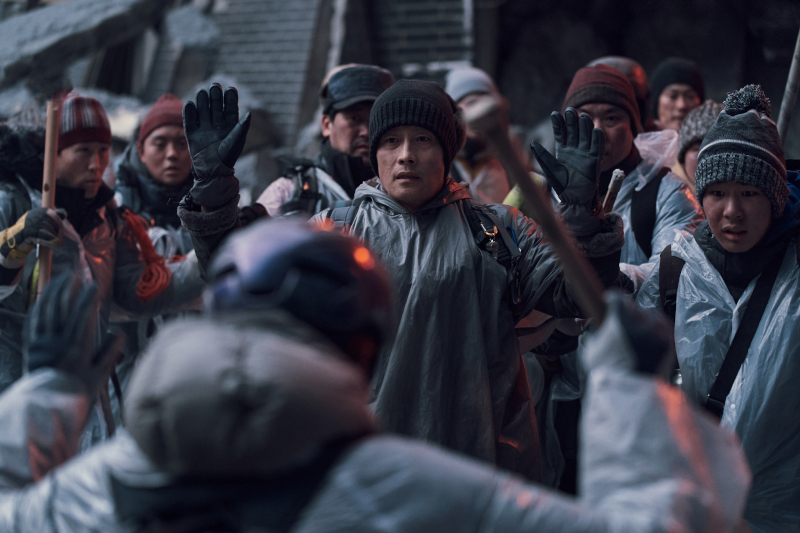Director – Eom Tae-hwa – 2023 – South Korea – Cert. 15 – 130m
****1/2
A massive earthquake makes the residents of the sole Seoul apartment block still standing close their doors to survivors outside – out on UK digital platforms on Monday, April 1st
Concrete: a structural material made of aggregate, cement, and water. (Definition from Encyclopedia Britannica.) Harsh. Unyielding. Impenetrable. Opaque. Not alive. Commonly used in today’s world in the manufacture of buildings, and associated with Brutalist architecture.
Utopia: an ideal community whose inhabitants exist under seemingly perfect conditions. (Definition from Encyclopedia Britannica.) The English word derives from two Greek words, the compound meaning of which is nowhere. Hence, “seemingly”. Utopias tend to have some fatal flaw. If they didn’t, any story about them would lack dramatic conflict. Thus, the word carries within it a degree of irony.
The eponymous montage of these two words pits them against each other: an unyielding, dead physicality confronts the optimism of a better world. The title evokes JG Ballard’s novels Concrete Island (1974) and High-Rise (1975), the former about a stranded motorist struggling to survive on a spaghetti junction after a car accident, the latter about a newly built block of flats in which the residents descend through social breakdown towards a new order.
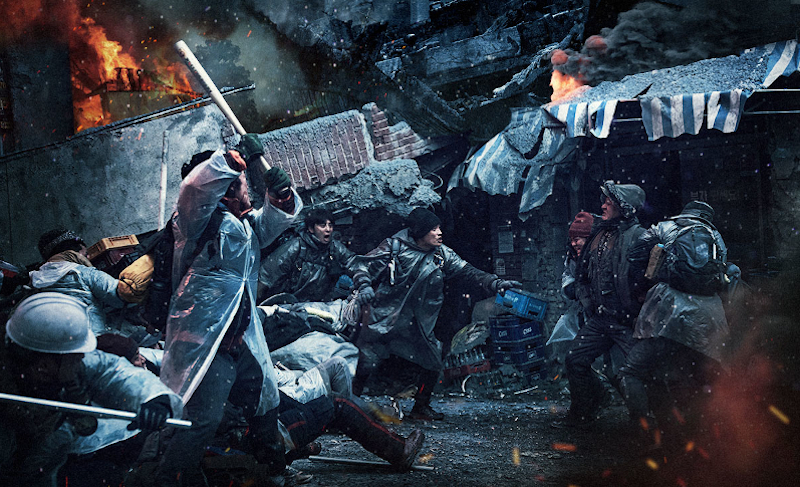
The South Korean film Concrete Utopia conflates these two ideas. In place of a car accident, it starts with a massive earthquake which decimates the city in which it is set (the South Korean capital Seoul). In much the same way that High-Rise is set in a building that cuts itself off from the outside world, so Concrete Utopia is about the residents of the one high rise block of flats to inexplicably survive the devastation who refuse to admit survivors from the outside.
An opening montage shows black and white, square framed footage of construction of numerous blocks of flats, giving way to 4:4 Academy colour shots of such blocks and, finally, full 16:9 images of tower blocks in modern, urban South Korea to the strains of music that, to English ears, sounds like the tune of ‘There’s no place like home’. An urban utopia. What could possibly go wrong? Short answer, a massive earthquake. Cure panoramic view of high-rise covered Seoul, panning to tremors that start to undermine and threaten to topple the edge of the city.
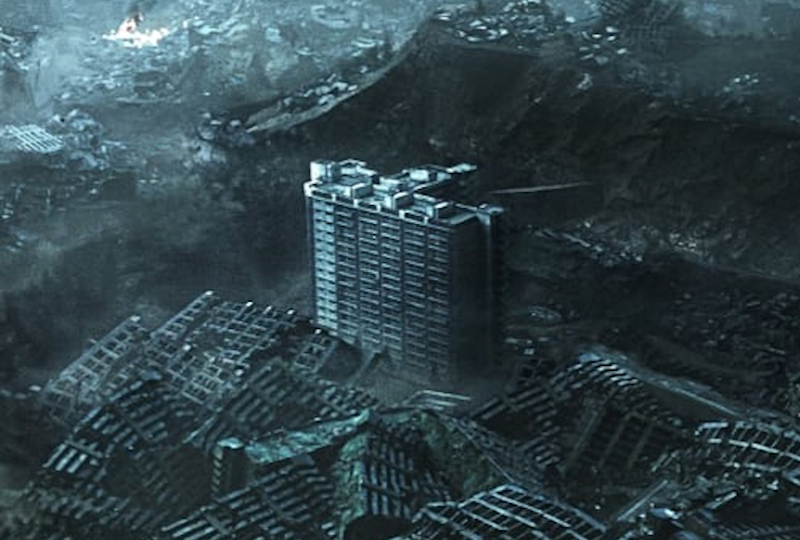
Cut to an apartment interior where Min-sung (Park Seo-joon from Parasite, Bong Joon Ho, 2019) and his wife Myeong-hwa (Park Bo-young) are waking up to another day in Flat 602. Looking out of the window, they learn that their tower block complex has miraculously survived an earthquake that has decimated the rest of the city. Inside the building are the block’s residents; outside are all the people suddenly made homeless desperate to gain entry, not least because of the freezing weather conditions. Somehow, a young woman and her small child appear and get a foot in at their apartment door. Myeong-hwa lets them in, not because the woman thrusts an expensive item of clothing towards her as payment, but rather out of sheer human compassion.
The complex’s Women’s Association President Geum-ae from Flat 1207 (Kim Sun-young from Broker, Hirokazu Kore’eda, 2023; Return to Seoul, Davy Chou, 2022) holds meetings with other residents in her flat to decide how they should move forward. When a fire breaks out in one of the other blocks on the complex, Min-sung marshals a hose to put the fire out, almost bungling it when the powerful jet of water momentarily causes him to lose control until Yeong-tak from Flat 902 (Lee Byung-hun from Squid Game, TV series, 2021-; The Man Standing Next, Woo Min-ho, 2020; The Age of Shadows, Kim Jee-woon, 2016) saves the day and helps him. When a later Geum-ae meeting is looking for someone to stand as a delegate to represent the complex’s residents, Yeong-tak is the obvious choice. He later makes Min-sung the head of his Anti-Crime Force.
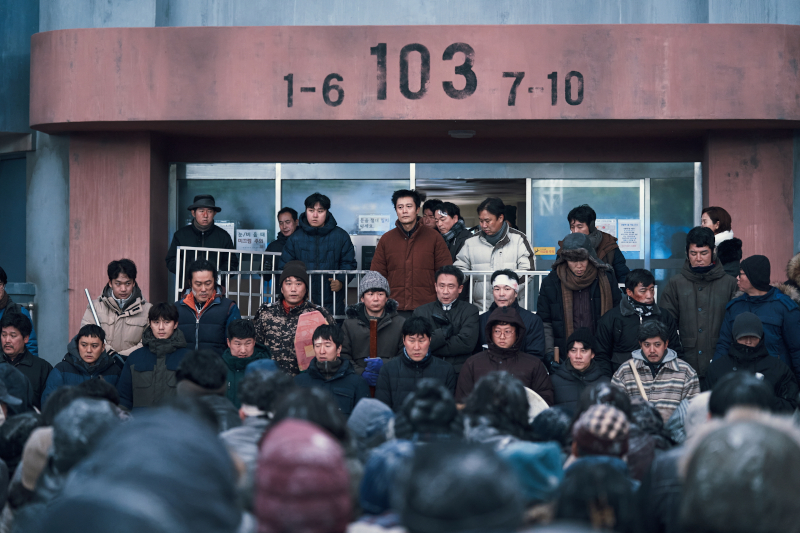
The residents also discuss whether they should try and take in other people or keep their complex for residents only, voting in favour of the latter. Delegate Yeong-tak must go down to inform the crowds outside the complex of their decision, which leads understandably to an ugly and violent confrontation, with those on the outside, including a congressman, feeling that they are effectively being sentenced to death given the freezing temperature. Later, Yeong-tak and Min-sung lead parties outside to look for more food.
Rather than explore the Ballard / High-Rise social disintegration that you might expect, the film develops a second narrative strand, in which Yeong-tak is revealed as a taxi driver who stole that identity following his being conned out of a large sum of money when he believed he was buying Flat 902. When his missing neighbour, schoolgirl Hye-won from Flat 903 (Park Ji-hu from House of Hummingbird, Kim Bora, 2018), turns up, she starts telling residents that he is not the real Yeong-tak. It will only be a matter of time before the grisly murder mystery in which he is embroiled comes to light.
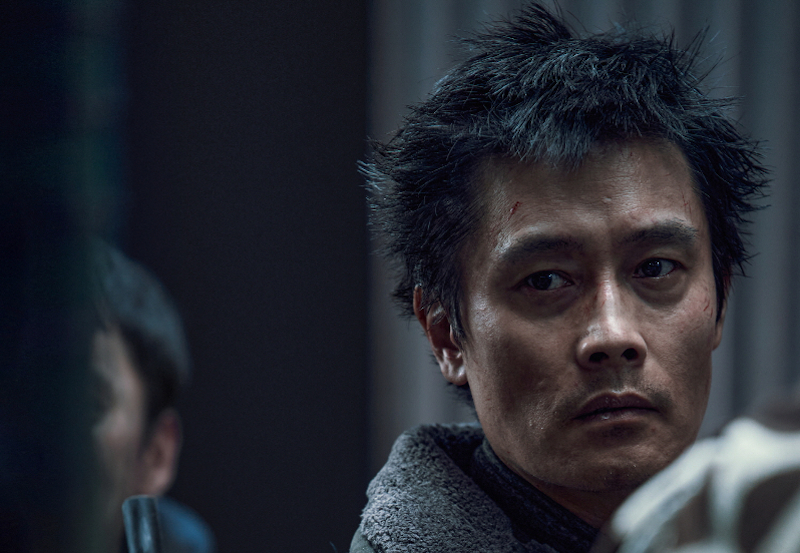
If the film doesn’t push its utopian / dystopian themes as much as it might, it nevertheless strikes a nice balance between the large scale stuff (earthquake and post-earthquake special effects and sets, exterior scenes in which the residents go out exploring and encounter other survivors), the medium scale (interaction between the residents and outsiders hoping they will come to their aid) and smaller scale (domestic scenarios with the occupants of flat 602, 902 and, later on, 903). It never has the problem of a British film like, to take a recent example, The End We Start From (Mahalia Belo, 2023), where you constantly feel there should be more special effects, but the budget isn’t big enough, yet conversely, Concrete Utopia isn’t ultimately quite as brave as that film in terms of discussing ideas and following them through when it can fall back on straightforward, crime thriller narrative (however gripping the latter might genuinely be).
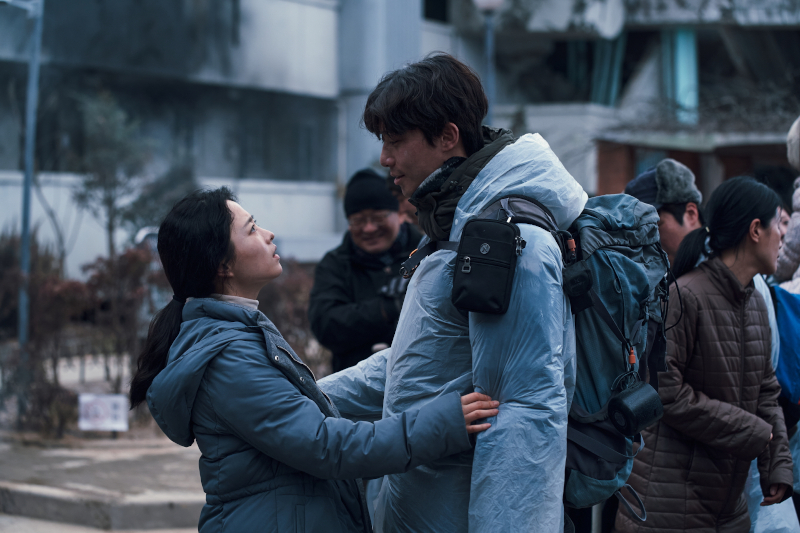
No explanation is ever offered for the inciting earthquake, and the film closes on an optimistic note; a different group of survivors welcoming a visitor into their home which is a building fallen on its side, meaning that one wall is the former floor and the premises – a flat turned on its side – are narrow and tall with a high ceiling. Their welcome of others stands in marked contrast to the block residents’ more selfish attitude, but then, the sideways people are a much smaller group, a family unit, and this no doubt affects their decision-making process.
For all its shortcomings, Concrete Utopia is an impressive dystopia / survival / crime movie. With its bravura earthquake effects and devastated landscape vistas, it deserves to be seen on the big screen. It’s a sad indictment on this country’s film distribution that none of the bigger distributors here have picked it up for the big screen theatrical release it so clearly deserves, even if London East Asia Film Festival played it on such a screen for their Closing Gala last year. Nevertheless, I take my hat off to Blue Finch for releasing it online in the UK, of which opportunity you should avail yourself as soon as possible.
Concrete Utopia is out on digital platforms in the UK on Monday, April 1st.
Trailer:
